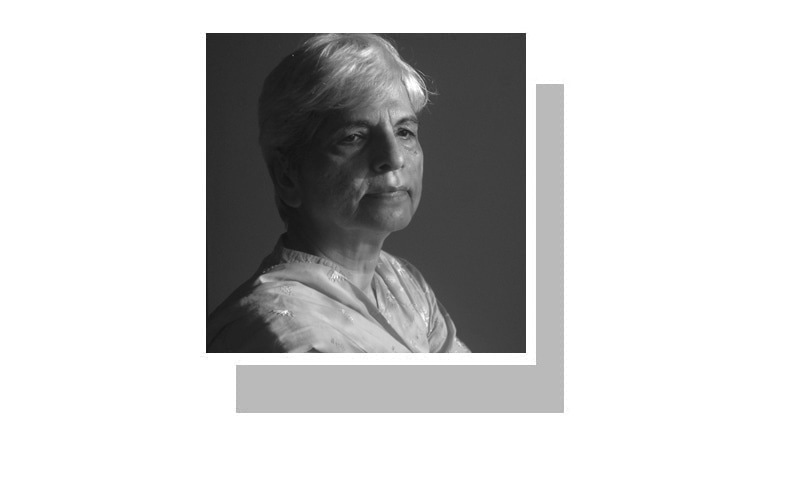IN his highly readable book Slaughtered Without A Knife, retired chief justice of Pakistan Jawwad S. Khawaja gives an account of his oath-taking ceremony in Islamabad in August 2015. I reproduce excerpts as readers would find his own words poignant and also appreciate the author’s views on austerity and ostentation:
“[My] oath-taking ceremony was held at the glaringly incongruous Presidential Palace. This was on Aug 17, 2015. A couple of days before that, a steel trunk was delivered to my chamber. It contained outlandish, ornate robes, a pair of shoes with metal buckles, a wig and other paraphernalia … The crow trying to mimic the swan, as the Seraiki saying goes. The strange, out-of-place attire reminded me of the occasions when I had attended the oath-taking ceremonies of the two chief justices who immediately preceded me. They had worn these same robes … I found the regalia to symbolise obsequious servility to the pre-independence British era which continues to awe us and enchants our imagination …
“I, therefore, had the trunk with its contents sent back ... there was a law on our statute books prescribing a dress code for judges … It was worn by me at my oath-taking … [What was] apparent from this incident was the unnecessary emphasis on ritual and form over substance. The pomp, show and extravagance of the whole ceremony made me think: ‘can this attitude be justified when our governments are approaching all and sundry, with begging bowl in hand?’ It is a question all public officials, being trustees for the people of Pakistan, need to think about …
“I had gone to the Presidential Palace for the oath with my friend and driver, Sardar Ali Hasan, in my official car; very functional, though somewhat old. … For now, after the oath, when I came out of the front entrance of the Presidential Palace, I was surrounded by many fawning officials, but I did not find Sardar.
All the rulers do is to show their insensitivity.
“I inquired about him and my car, and was shown a large and obviously very expensive one; a top-of-the-line bullet-proof Mercedes Benz. I was informed that this now was my official vehicle. It was to be accompanied by a convoy of vehicles … full of security personnel, an ambulance, a vehicle fitted with equipment to detect and disable explosives and a few other vehicles. So, within the two hours or so between my arrival and my departure from the Presidential Palace, I had been transformed from a mortal into a demigod with entitlement.
“I told whoever was in charge that I did not want this car and security detail. So, Sardar came with my perfectly functional car in which I returned to the Supreme Court. It is such things as cars, convoys, security details and fawning sycophantic officials, which may help explain how, at times, a perfectly normal and sensible person starts behaving like a megalomaniac. In my view, such showy and pretentious displays at the state’s expense cannot be justified. A more frugal ceremony would have been better and more dignified.”
The ostentation Khawaja Sahib writes about continues to be as relevant today as it was back in 2015. Matters are worse given the magnitude of the economic crisis. Egalitarianism remains utopian for those who dream of equal distribution of wealth in society. While the underprivileged starve, their rulers travel with large entourages at state expense in a show of wealth to impress their patrons. But all they manage to do is demonstrate their insensitivity.
Today, when inflation stands at an astounding high of about 30pc, oil is the biggest chunk of Pakistan’s imports. Were this to be regulated it would make a profound impact. Are the huge cavalcades as described by the author really necessary? Are the lavish perks (bribe, should we say) that include petrol allowances running into hundreds of litres for senior civil servants essential? My activist friend Naeem Sadiq calculates that the petrol perks to our administrators cost Rs216 billion annually. Is so much petrol needed to transport the high and mighty from one office to another? Obviously this allowance is grossly misused.
More than three decades ago, a prime minister who doesn’t figure much in our current political discourse addressed the issue of austerity in official transport. He was Mohammad Khan Junejo who is credited with the words “Mein generals ko bhi Suzuki mein bitha doon ga” (‘I’ll also seat the generals in Suzukis’). He didn’t succeed in his mission and lost his job.
Times have changed and we face an existential crisis today. There must be people in our administration who are equally concerned. They must show the moral courage and integrity to emulate Khawaja Sahib. He rejected the luxury offered to him and continued to perform his duties efficiently and honestly, without losing the respect and affection of the people of Pakistan.
Published in Dawn, September 8th, 2023














































